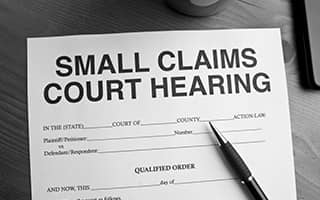Instant Court Case Lookup
The following is for information purposes only
Table of Contents
Small Claims

A small claims court is a specialized division within the U.S. judicial system designed to handle low-value civil disputes through a simplified, accessible process. Operating within district, county, justice, or municipal courts, they provide an accessible venue for individuals and businesses to handle everyday conflicts.
The advantages of a small claims court are significant: expedited timelines, lower filing fees, reduced procedural hurdles, and quicker judgments. Each state sets its own monetary jurisdiction limit.
Additionally, the threshold varies based on location, type of claim, or whether the party is an individual or a business. Small claims courts also have limits on the types of cases they can hear and generally cannot consider some matters or requests that require injunctive relief.
Small claims courts differ from general civil divisions in both structure and procedure. While civil courts allow full discovery, attorney representation, and expensive motion practice, small claims courts emphasize informality, limited evidence rules, and self-representation.
Many states restrict or prohibit attorneys' involvement to maintain fairness for self-represented parties. Furthermore, in small claims courts, when an appeal is allowed, it typically proceeds de novo in a higher court.
Types of Cases Heard in Small Claims Court
Small claims courts handle a targeted set of civil disputes that are monetary in nature and relatively straightforward.
-
Common Civil Disputes: The most common cases for civil disputes held in small claims courts include unpaid loans or invoices, such as personal loans, unpaid rent, or outstanding service invoices. It includes property damage claims, such as vehicle repairs, damaged personal belongings, or contractor-related losses.
Additionally, common civil disputes heard in small claims court include landlord-tenant conflicts that involve security deposits, minor habitability issues, or rent disputes.
-
Excluded Cases: Small claims courts exclude entire categories of civil cases due to their complexity or legal sensitivity. These include family law issues, such as divorce, custody, and child support actions, as well as criminal matters, defamation claims, and bankruptcy filings. Additionally, it does not cover probate or estate disputes, and cases that seek injunctive relief instead of damages.
Specific categories by state show how these boundaries operate. California hears consumer, contract, and property-damage claims but routes evictions to separate courts. New York's small claims courts accept money-only cases, while housing disputes proceed through Housing Court.
Texas Justice Courts handle debt and property damage claims, with eviction cases processed separately. Florida limits small claims to monetary disputes and excludes most non-monetary remedies. Illinois allows small-money claims and limited replevin but bars equitable relief.
State-by-State Small Claims Court Limits
|
State |
Maximum Claim Amount |
Typical Filing Fee |
Appeal Rights |
|---|---|---|---|
|
Alabama |
$6,000 |
$50-$100 |
Either party may appeal within 14 days |
|
Alaska |
$10,000 |
$50-$100 |
Appeal to the Superior Court within 30 days |
|
Arizona |
$3,500 |
$30-$70 |
De novo appeal to the Superior Court |
|
Arkansas |
$5,000 |
$65-$80 |
30 days to appeal |
|
California |
$10,000 (individuals), $5,000 (businesses) |
$30-$75 |
Defendant may appeal within 30 days |
|
Colorado |
$7,500 |
$55-$80 |
14 days to appeal |
|
Connecticut |
$5,000 |
$95 |
De novo appeal allowed |
|
Delaware |
$15,000 |
$35-$50 |
Appeals to the Court of Common Pleas |
|
Florida |
$8,000 |
$55-$300 |
Appeals allowed within 30 days |
|
Georgia |
$15,000 |
$50-$65 |
30 days to appeal |
|
Hawaii |
$5,000 |
$35-$60 |
Appeal to the circuit court |
|
Idaho |
$5,000 |
$69 |
30-day appeal window |
|
Illinois |
$10,000 |
$40-$75 |
Appeal within 30 days |
|
Indiana |
$10,000 |
$97 |
De novo appeal permitted |
|
Iowa |
$6,500 |
$85 |
Appeals within 20 days |
|
Kansas |
$4,000 |
$55-$75 |
Appeals to the District Court |
|
Kentucky |
$2,500 |
$50 |
10-day appeal period |
|
Louisiana |
$5,000 |
$25-$75 |
Appeals allowed to the District Court |
|
Maine |
$6,000 |
$80 |
Appeals within 30 days |
|
Maryland |
$5,000 |
$35-$50 |
Appeal to the Circuit Court |
|
Massachusetts |
$7,000 |
$40-$150 |
De novo appeal to the District Court |
|
Michigan |
$6,500 |
$30-$70 |
21 days to appeal |
|
Minnesota |
$15,000 |
$65-$80 |
Appeal to the District Court |
|
Mississippi |
$3,500 |
$75 |
30-day appeal limit |
|
Missouri |
$5,000 |
$35-$70 |
Appeals within 10 days |
|
Montana |
$7,000 |
$50-$70 |
30-day appeal window |
|
Nebraska |
$3,900 |
$35 |
30 days to appeal |
|
Nevada |
$10,000 |
$66 |
Appeal to the district court |
|
New Hampshire |
$10,000 |
$75 |
Appeals within 30 days |
|
New Jersey |
$5,000 |
$35-$50 |
De novo appeal to the Law Division |
|
New Mexico |
$10,000 |
$77 |
15 days to appeal |
|
New York |
$10,000 (NYC), $5,000 (other areas) |
$20-$25 |
Appeal to the County Court |
|
North Carolina |
$10,000 |
$96 |
10-day appeal limit |
|
North Dakota |
$15,000 |
$10-$50 |
Appeal within 30 days |
|
Ohio |
$6,000 |
$30-$80 |
Appeal to the municipal or county court |
|
Oklahoma |
$10,000 |
$58 |
30-day appeal period |
|
Oregon |
$10,000 |
$57-$83 |
Appeals allowed in circuit court |
|
Pennsylvania |
$12,000 |
$40-$60 |
Appeal to the Court of Common Pleas |
|
Rhode Island |
$2,500 |
$60 |
Appeal to the District Court |
|
South Carolina |
$7,500 |
$50-$75 |
30-day appeal deadline |
|
South Dakota |
$12,000 |
$20-$70 |
Appeals within 30 days |
|
Tennessee |
$25,000 |
$50-$100 |
Appeals allowed within 10 days |
|
Texas |
$20,000 |
$46-$100 |
Appeal de novo to the County court |
|
Utah |
$15,000 |
$60-$75 |
Appeal within 28 days |
|
Vermont |
$10,000 |
$65 |
Appeal to the Superior Court |
|
Virginia |
$5,000 |
$50 |
Appeals within 10 days |
|
Washington |
$10,000 (individuals), $5,000 (businesses) |
$35 |
30-day appeal window |
|
West Virginia |
$10,000 |
$30 |
Appeal within 20 days |
|
Wisconsin |
$10,000 |
$94 |
Appeal to the circuit court |
|
Wyoming |
$6,000 |
$20-$50 |
Appeal within 30 days |
The Small Claims Hearing Process

The small claims hearing process is designed for self-representation, enabling parties to present their disputes efficiently without the need for an attorney.
Parties should arrive on time, check in with the clerk, and explain their case clearly to the judge. The plaintiff bears the burden of proof by providing clear evidence, while the defendant responds or asserts counterclaims.
Relevant evidence, such as contracts, receipts, photographs, correspondence, or estimates, should be organized and presented to support claims. Witnesses may be called to testify if needed. Proper court etiquette is essential: be punctual, address the judge respectfully, speak when prompted, and avoid arguing directly with the opposing party.
If a party fails to appear, the court may either dismiss the case or issue a default judgment, which is enforceable in the same manner as a contested case.
Judgments and Enforcement
After a small claims hearing, the court issues a judgment detailing the winning party, the amount owed, and any applicable costs or interest. This judgment is entered on the court docket, making it legally enforceable.
If the debtor fails to pay voluntarily, the creditor can enforce the judgment through wage garnishment, bank levies, judgment liens on property, or debtor examinations to locate assets. Limited post-judgment motions, such as requests to vacate or appeals for a trial de novo, are available but must be filed within strict deadlines and based on valid grounds.
Enforcement periods vary by state, typically ranging from five to twenty-five years, with the possibility of renewal. Once the debt is fully paid, the creditor files a Satisfaction of Judgment to officially close the case.
Small Claims Records and Dockets
Small claim records provide a complete account of a case and are maintained by the court clerk. They typically contain:
-
The initial filings, such as complaints, statements of claim, and proof of service.
-
Hearing transcripts or minute entries summarizing proceedings.
-
Judgment and post-judgment orders, including Satisfaction of Judgment.
-
Docket entries, with case numbers, parties involved, and chronological updates.
Public vs. Sealed Records
Most small claims records are considered public information, accessible to interested parties, researchers, and legal professionals under state open-records statutes. However, some files remain confidential or may be sealed to protect sensitive information, such as cases involving juveniles, confidential settlements, or protective orders. The courts limit access to protect parties while maintaining transparency of procedural and outcome-related information.
How to Access Small Claims Records
Small claims records can be accessed online through the state county court portals, where users can search by case number, party name, or filing date. Although rare, some federal small claims cases are available through PACER (Public Access to Court Electronic Records).
For offline access to small claims records, individuals may request certified copies from the county clerk's office in person or by mail. Access typically requires providing valid identification, case details, and paying the required fees. Certified records are typically required for enforcement, appeals, or legal verification.
Frequently Asked Questions About Small Claims
Here are questions commonly asked about small claims.
What if I lose my case? Can I appeal or ask for a rehearing?
Yes. You can file an appeal or motion to vacate within strict deadlines, usually ranging from 10 to 30 days, depending on state law and the type of judgment.
How long will it take for my case to be heard after filing?
Most courts schedule hearings within 30 to 90 days. However, delays may occur in busy jurisdictions or when there are complex service issues that may extend timelines.
When is small claims court not the right option (even if the amount is small)?
Small claims court is not suitable for cases involving injunctions, title disputes, divorce matters, probate issues, or complex legal issues that fall outside its limited authority.
How do I determine whether the person or business I want to sue is eligible/identifiable?
You can use official public records, business licenses, Secretary of State databases, or local tax and property records to confirm the legal name or identity of a person or business you intend to sue.
How much does it cost in filing fees, and will I ever get my money if I win?
Filing fees usually range from $30 to $100. Generally, winning a judgment does not guarantee payment. Collecting the money typically depends on the defendant's assets, employment, or willingness to pay.
Can minors or businesses sue or be sued in small claims court?
While minors can be sued in a small claims court, they must appear through a parent or legal guardian. Similarly, businesses can sue and be sued under their registered legal entity name.
Are there language or accessibility accommodations in small claims hearings?
Yes. Courts generally provide interpreters, ADA accommodations, or auxiliary aids when requested ahead of the hearing date.
What is the statute of limitations for filing a small claims case?
The statute of limitations for filing a small claims case generally aligns with civil dispute deadlines: typically, 2-6 years for contract claims and 1-3 years for property damage or personal injury, depending on state law.